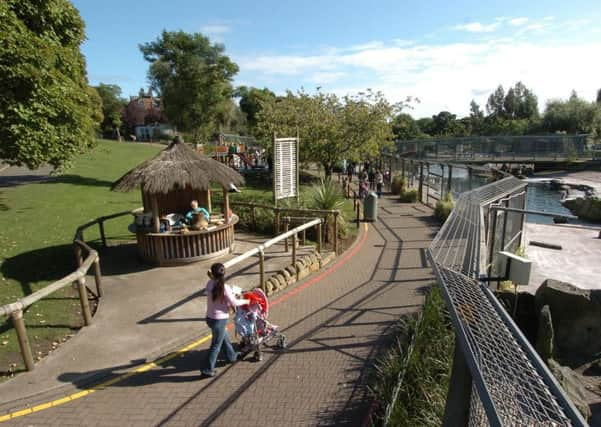Letter: Good samaritan zoo-goers restored my faith in humanity


Good Samaritans came to my rescue
I can only say how very much I appreciated the assistance these wonderful people gave me and the time they took out of their Sunday afternoon to remain with me, keeping me company for longer than I could have expected anyone to do so.
The adjacent Holiday Inn also sent help, including a first aider, and provided a chair, while I waited for the ambulance to arrive. The paramedics, doctors and nurses at Edinburgh Royal Infirmary deserve just as much praise and thanks.
Advertisement
Hide AdAdvertisement
Hide AdIt restores every sense of faith in human nature, that any of us may lose in a world where people can be so busy that they walk by people in need.
Pam Smith, Monifieth, Dundee.
Research shows us that smacking kids is harmful
Some claim that corporal punishment for children, unlike actual physical abuse, causes no detectable physical, psychological or emotional harm, and has no detectable negative behavioural consequences. They could not be more wrong.
Research studies made over a long number of years and one involving more than 160,000 children, clearly indicated that children who are smacked are more likely to exhibit higher levels of aggression and mental health problems. Other research indicates that children who are smacked are more likely to be abusive to their partners as adults.
The policy to ban smacking isn’t actually an SNP policy. It was proposed by the Green MSP and ex-policeman John Finnie, and somewhat belatedly adopted by the government.
Advertisement
Hide AdAdvertisement
Hide AdThe example of the 53 countries that have banned smacking shows that the introduction of the legislation in conjunction with education of its existence along with alternative discipline strategies, has meant that parents have not been “criminalised”.
I’m pretty sure that if the police in those countries can cope without wholesale prosecutions, the Scottish police will manage to approach this issue with sensitivity.
Gill Turner, Derby Street, Edinburgh.
Business makes views heard on Indyref2
A pro-union group of Scottish businessmen reports that Scottish independence would be eight times as damaging as a hard Brexit. Well, they would say that, wouldn’t they?
But two points follow from this. First, their appearance in the fray means that the separatists have to be able to argue in detail with people on the inside track. Simply shouting ‘tosh’ is not enough. Producing real evidence, not Salmondesque imaginary figures, is what they need to do.
Advertisement
Hide AdAdvertisement
Hide AdSecond, it is cheering to see Scottish businessmen putting their heads above the parapet. For the last five years they have been too reluctant to do so. Fear of losing Scottish government contracts undoubtedly deterred many. The mere thought of a visit or phone call from an irate government minister silenced others.
If there is to be further discussion of another referendum – and let us hope that will not happen – then these businessmen really need to do the heavy lifting instead of leaving it to the rather feeble pro-Union parties and concerned individuals.
Jill Stephenson, Glenlockhart Valley, Edinburgh.
Brexit deal needs a two-thirds majority
While in general agreement with the points made by Phil Tate (‘Damaging Brexit no-deal should not be on the table’, Letters, 17 September), I am afraid a general election would possibly make thing worse. Labour are as divided, if not more so, than the Tories.
The real and only solution is that a law is passed making a two-thirds majority necessary for any constitutional change, as it is in the USA.
Alexander McKay, New Cut Rigg, Edinburgh.
Overweight Britain needs to take notice
Advertisement
Hide AdAdvertisement
Hide AdThe news that only two out of 53 European countries are more overweight than Britain is a wake up call screaming at us to find more achievable ways to move more.
It can be difficult to keep active, especially for those with office jobs, but inactivity is making people unhealthy and unhappy.
Even a short, brisk walk can have fantastic mental and physical health benefits, helping to prevent long-term chronic health conditions such as type 2 diabetes, heart disease and depression.
Direct NHS savings from an increase in urban walking and cycling have been estimated at £17bn over 20 years. What’s more, it is incredibly easy to fit into a day – on the commute, the school run, or a trip to the shops.
Advertisement
Hide AdAdvertisement
Hide AdThis isn’t just about improving our current situation; it’s about safeguarding the future of our children. One in five boys and one in six girls of primary school-age are classed as physically inactive, and one in three children leaves primary school either overweight or obese.
Swapping the school run for a school walk helps build more exercise into a child’s day and ensures they develop healthy habits for life.
Earlier this year, Public Health England had to add a ‘severely obese’ category to its measurements of children aged four and five, and children aged 10 and 11. This should be enough to tell us that inaction can’t continue.
Tanya Braun, Living Streets, Wentworth Street, London, E1.